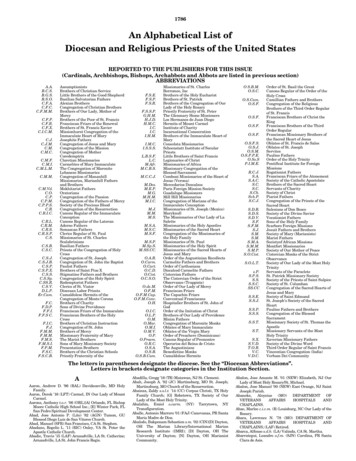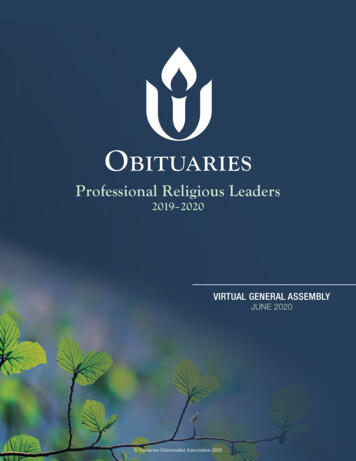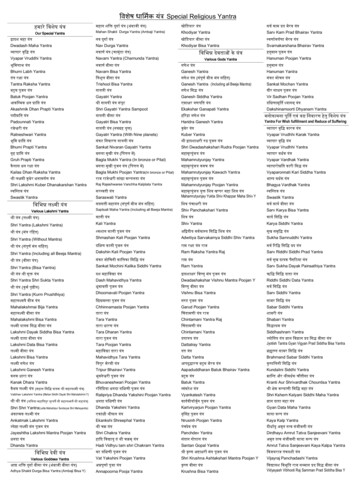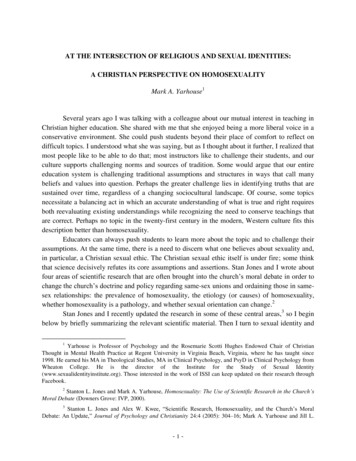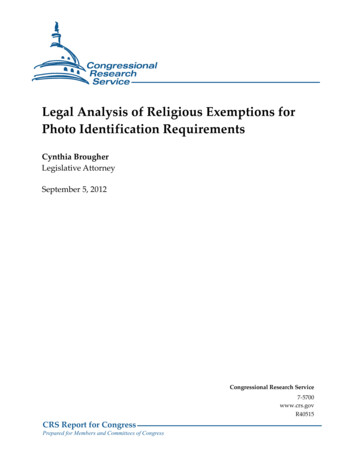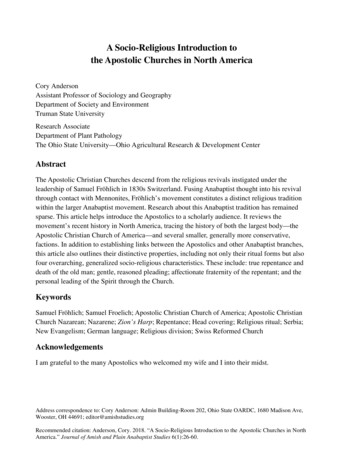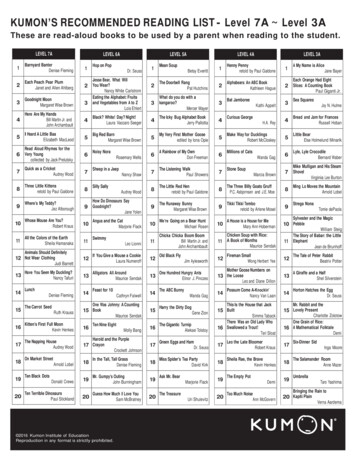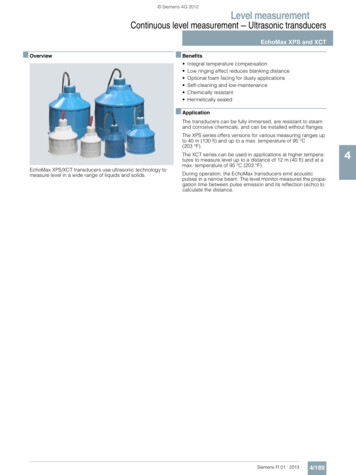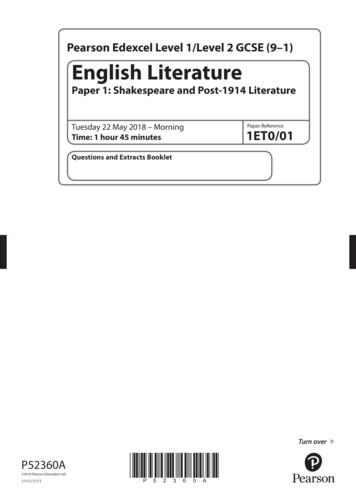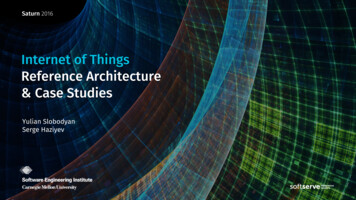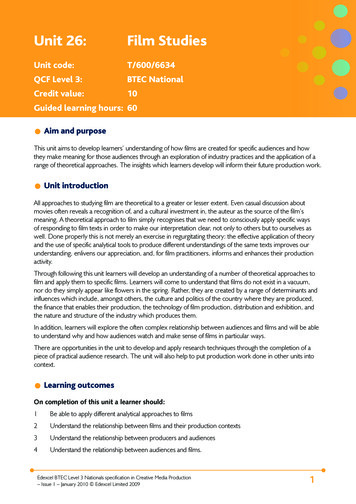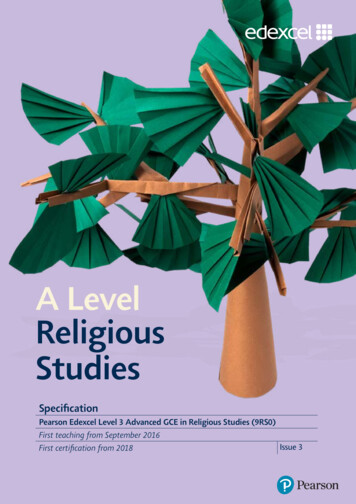
Transcription
A LevelReligiousStudiesSpecificationPearson Edexcel Level 3 Advanced GCE in Religious Studies (9RS0)First teaching from September 2016First certification from 2018Issue 3
Summary of A Level Religious Studies SpecificationIssue 3 changesSummary of changes made between previous issue and this current issuePagenumberClarification of what students need to learn for topic 2.3 in Paper 219Clarification of what students need to learn for topic 4.1 in Paper 327Correction of reference for topic 6.2 in Paper 329Biblical reference corrected30Clarification of what students need to learn for topic 3.2 in Paper 4, option 4A.35Clarification of what students need to learn for topic 3.1 in Paper 4, option 4D.54Correction to the definition of Analyse in Appendix 1: Command word definitions79If you need further information on these changes or what they mean, contact us via our website s.html.
Contents1Introduction2Why choose Pearson Edexcel A Level Religious Studies?2Supporting you in planning and implementing this qualification3Qualification at a glance428Subject content and assessment informationPaper 1: Philosophy of Religion9Paper 2: Religion and Ethics17Paper 3: New Testament Studies24Paper 4: Study of Religion32Assessment Objectives71372Administration and general informationEntries72Access arrangements, reasonable adjustments, special consideration andmalpractice72Student recruitment and progression75Appendix 1: Command word definitions79Appendix 2: The context for the development of this qualification80Appendix 3: Transferable skills82Appendix 4: Level 3 Extended Project qualification83Appendix 5: Codes85
1 IntroductionWhy choose Pearson Edexcel A Level ReligiousStudies?We have listened to feedback from all parts of the religious studies community, includinghigher education. We have used this opportunity of curriculum change to redesignqualifications to reflect the demands of a truly modern and evolving religious studiesenvironment. This new qualification will allow students to apply a wide range of conceptsenabling them to confidently interpret, contextualise and analyse the expressions of religionsand world views they encounter.Clear and coherent structure – our qualification offers a choice of three from the followingfour components - Philosophy of Religion, Religion and Ethics, New Testament Studies and astudy of a chosen religion. All of the components are assessed through an externallyexamined paper which follow the same structure.Develops understanding and appreciation – this qualification encourages students todevelop an appreciation of religious thought and its contribution to individuals, communitiesand societies. The qualification does this through an enquiring, critical and reflectiveapproach to the study of religion.Helps develop a holistic understanding of religion – the specification facilitates enquiryinto, and develops insightful evaluations of, ultimate questions about the purposes andcommitments of human life, especially as expressed in philosophy, ethics and religion. Thequalification encourages students to make connections so that in each field of study theyunderstand the influences over time of developments in religious beliefs and practices, thephilosophy of religion, religious ethics and/or textual interpretation.Provides a focus on scholarship – in the second year of study the specification contentencourages students to compare the significant ideas presented in works of scholars selectedfrom the fields of philosophy, ethics and religion. This will enable students to reflect on anddevelop their values, opinions and attitudes in the light of their studies.Develops transferable skills for progression to higher education – students will useideas from a range of approaches to the study of religions and beliefs in order to researchand present a wide range of well-informed and reasonable arguments, which engageprofoundly with moral, religious and spiritual issues. This will enable students to make asmooth transition to the next level of study.Supports progression from Key Stage 4 – the content builds on the understandingdeveloped at Key Stage 4, while also ensuring that students new to the subject areappropriately supported.AS and A Level qualifications that are co-teachable – co-teaching AS and A Levelprovides flexibility for you and your students. Centres co-teaching AS and A Level can deliverthe first three topics in each component in the first year, allowing students to be entered forthe AS at the end of year.2Pearson Edexcel Level 3 Advanced GCE in Religious StudiesSpecification – Issue 3 – May 2018 Pearson Education Limited 2018
Supporting you in planning and implementing thisqualificationPlanning Our Getting Started guide gives you an overview of the new AS and A Levelqualifications to help you get to grips with the changes to content and assessment and tohelp you understand what these changes mean for you and your students. We will give you an editable course planner and scheme of work that you can adapt tosuit your department. Our mapping documents highlight key differences between the new and currentqualifications.A Level Religious Studies Anthology The A Level Religious Studies Anthology can be downloaded from our websitequalifications.pearson.com. Candidates will not be required to take a copy of theanthology into the examination. Relevant excerpts will be printed in the examinationpaper.Preparing for examinationsWe will also provide a range of resources to help you prepare your students for theassessments, including marked exemplars of student work with examiner commentaries andadditional specimen papers for A Level.ResultsPlusResultsPlus provides the most detailed analysis available of your students’ examperformance. It can help you identify the topics and skills where further learning wouldbenefit your students.Get help and supportOur support line and Ask the Expert will ensure you receive help and guidance from us andthat you can share ideas and information with other teachers. You can sign up to receivee-newsletters from the subject advisor service for qualification updates and product andservice news.The Religious Studies Team can be contacted by email at:TeachingReligiousStudies@pearson.com and by telephone: on 0844 463 2817.Learn more at qualifications.pearson.comPearson Edexcel Level 3 Advanced GCE in Religious StudiesSpecification – Issue 3 – May 2018 Pearson Education Limited 20183
Qualification at a glanceContent and assessment overviewThe Pearson Edexcel Level 3 Advanced GCE in Religious Studies consists of threeexternally-examined papers. Students are required to choose three papers from a choiceof four.Students must complete all assessment in May/June in any single year.Paper 1: Philosophy of Religion (*Paper code: 9RS0/01)Written examination: 2 hours33.33% of the qualification80 marksContent overviewPhilosophical issues and questions; The nature and influence of religious experience;Problems of evil and suffering; Philosophical language; Works of scholars; Influences ofdevelopments in religious belief.Assessment overviewAn externally-assessed written examination comprising three sections. Students answer allquestions in Section A, Section B and Section C.Section ATwo structured questions.Section BOne two-part essay question on an excerpt, sourced from the extracts list. These arepublished in the A Level Religious Studies Anthology, which can be downloaded from ourwebsite. Candidates will not be required to take a copy of the anthology into theexamination. Relevant extracts will be printed in the examination paper.Section COne extended essay question.4Pearson Edexcel Level 3 Advanced GCE in Religious StudiesSpecification – Issue 3 – May 2018 Pearson Education Limited 2018
Paper 2: Religion and Ethics (*Paper code: 9RS0/02)Written examination: 2 hours33.33% of the qualification80 marksContent overviewSignificant concepts in issues or debates in religion and ethics; A study of three ethicaltheories; Application of ethical theories to issues of importance; Ethical language;Deontology, Virtue Ethics and the works of scholars; Medical ethics: beginning and end of lifeissues.Assessment overviewAn externally-assessed written examination comprising three sections. Students answer allquestions in Section A, Section B and Section C.Section ATwo extended-response questions.Section BOne two-part essay question on an excerpt, sourced from the extracts list. These arepublished in the A Level Religious Studies Anthology, which can be downloaded from ourwebsite. Candidates will not be required to take a copy of the anthology into theexamination. Relevant extracts will be printed in the examination paper.Section COne extended essay question.Pearson Edexcel Level 3 Advanced GCE in Religious StudiesSpecification – Issue 3 – May 2018 Pearson Education Limited 20185
Paper 3: New Testament Studies (*Paper code: 9RS0/03)Written examination: 2 hours33.33% of the qualification80 marksContent overviewSocial, historical and religious context of the New Testament; Texts and interpretation of thePerson of Jesus; Interpreting the text and issues of relationship, purpose and authorship;Ways of interpreting the scripture; Texts and interpretation: the Kingdom of God, conflict,the death and resurrection of Jesus; Scientific and historical-critical challenges, ethical livingand the works of scholars.Assessment overviewAn externally-assessed written examination comprising three sections. Students answer allquestions in Section A, Section B and Section C.Section ATwo extended-response questions.Section BOne two-part essay question on an excerpt, sourced from the extracts list. These arepublished in the A Level Religious Studies Anthology which can be downloaded from ourwebsite. Candidates will not be required to take a copy of the anthology into theexamination. Relevant extracts will be printed in the examination paper.Section COne extended essay question.Forbidden optionCandidates who enter for Paper 3: New Testament Studies cannot enter forPaper 4B: Christianity.6Pearson Edexcel Level 3 Advanced GCE in Religious StudiesSpecification – Issue 3 – May 2018 Pearson Education Limited 2018
Paper 4: Study of Religion (*Paper codes: 9RS0/4A-4F)Written examination: 2 hours33.33% of the qualification80 marksOptionsStudents take one of the following six options.4A: Buddhism4B: Christianity4C: Hinduism4D: Islam4E: Judaism4F: SikhismContent overviewReligious beliefs, values and teachings; Sources of wisdom and authority; Practices thatshape and express religious identity; Social and historical developments; Works of scholars;Religion and society; Primary texts.Assessment overviewAn externally-assessed written examination comprising three sections. Students answer allquestions in Section A, Section B and Section C.Section ATwo extended-response questions.Section BOne two-part essay question on an excerpt, sourced from the extracts list. These arepublished in the A Level Religious Studies Anthology which can be downloaded from ourwebsite. Candidates will not be required to take a copy of the anthology into theexamination. Relevant extracts will be printed in the examination paper.Section COne extended essay question.Forbidden optionCandidates who enter for Paper 4B: Christianity cannot enter for Paper 3: New TestamentStudies.*See Appendix 5: Codes for a description of this code and all other codes relevant to thisqualification.Texts in the A Level Religious Studies Anthology will be reviewed throughout the lifetime ofthe specification to ensure that all prescribed texts remain fit for purpose. In the event that achange is required, centres will be notified and the appropriate alternative will be posted onour website.Pearson Edexcel Level 3 Advanced GCE in Religious StudiesSpecification – Issue 3 – May 2018 Pearson Education Limited 20187
2 Subject content and assessmentinformationThe subject content sets out the knowledge, understanding and skills relevant to thisqualification. Together with the assessment information, it provides the framework withinwhich centres create their programmes of study, so ensuring progression from AS Levelrequirements and the possibilities for progression to higher education.Qualification aims and objectivesThe aims and objectives of this qualification are to enable students to: develop their interest in a rigorous study of religion and belief and relate it to the widerworld develop knowledge and understanding appropriate to a specialist study of religion develop an understanding and appreciation of religious thought and its contribution toindividuals, communities and societies adopt an enquiring, critical and reflective approach to the study of religion reflect on and develop their own values, opinions and attitudes in the light of their study.8Pearson Edexcel Level 3 Advanced GCE in Religious StudiesSpecification – Issue 3 – May 2018 Pearson Education Limited 2018
Paper 1: Philosophy of ReligionOverviewThe content for this paper helps students to explore some of the main contemporaryphilosophical issues and questions about religion, such as belief in God or the convictionthat life has both meaning and purpose. It provides a relevant and challenging context forexploring the particular beliefs, values and practices that characterise religious communities.In turn, the paper provides a sound basis for understanding and reflecting on thecontemporary influence of religion, the views of those who do not share a religious belief andthe impact of these factors on people’s lives.Students will engage with arguments and debates on religious and non-religious views of life,which focus on some key areas of controversy that shape modern views of the world, such asthe problem of evil and suffering. Students will extend their understanding throughengagement in debates on issues such as the value of evidence based on accounts ofreligious experience. They will analyse and evaluate particular viewpoints of thinkers whohave contributed to these debates.Students will extend the breadth and depth of their study by considering how religious ideasare expressed and communicated, and how they may differ from other contemporary waysof expressing beliefs about the world – for instance whether religious and scientific languageis incompatible or complementary, whether ideas about life after death are tenable in orrelevant to the modern world. As part of this process, students will study how ideas aboutthe philosophy of religion have changed over time, and the most important influences on thisprocess. They will use the writings of key scholars to explore differing viewpoints about thedevelopment of ideas in the philosophy of religion. These studies will give students theopportunity to explore links between this paper and other areas of study, such asthe impact of beliefs and values on modern life, the importance of tradition inreligious communities or the interpretation and application of religious texts in themodern world.It is compulsory for students to compare the work of two named scholars, including a specificextract of their work. The list of extracts at the end of the paper must be studied by allstudents and this includes the work of two named scholars for comparison. These arepublished in the A Level Religious Studies Anthology: Paper 1 – Philosophy of Religion whichcan be downloaded from our website. The context in which these texts could be studied isindicated by bracketed numbers in the detailed content, (1) for example. These extracts arenot exclusive to the topic areas under which they appear; students will need to be able toapply these extracts across any suitable topic. This allows for a range of questions, includingtext or language specific, as well as thematic.In this paper, students will be required to study the ideas of key contributors in relation tospecific content areas. These are indicated against each relevant sub-topic. Students will berequired to use these ideas to support and underpin their knowledge and understanding.Overall, this study will enhance students’ capacity to deal with controversial issues aboutbeliefs and values, to have confidence in their ability to express their ideas and to putforward their own beliefs and ideals supported by reasoned argument and evidence.Pearson Edexcel Level 3 Advanced GCE in Religious StudiesSpecification – Issue 3 – May 2018 Pearson Education Limited 20189
TopicsWhat students need to learn11.1Philosophicalissues andquestionsDesign Argumenta) Inductive reasoning, a posteriori types of arguments,interpretation of experience.b) Types of order and regularity, role of analogy, cumulativeeffect of evidence, anthropic principle, regularities ofco-presence and regularities of succession.c) Strengths and weaknesses of Design Arguments: probabilityrather than proof, alternative interpretations, includingevolution and deism. Challenges to the argument.d) Philosophical language and thought through significantconcepts and the works of key thinkers, illustrated in issues inthe philosophy of religion.With reference to the ideas of W Paley and D Hume.1.2Cosmological Argumenta) Inductive reasoning, a posteriori types of arguments.b) Principle of sufficient reason, explanation, interpretation ofexperience, movement, cause and effect, contingency, infiniteregress, first cause, necessary existence, Kalam version.c) Strengths and weaknesses of Cosmological Arguments:probability rather than proof, brute fact, debates aboutinfinite regress, necessary existence and God as a necessarybeing. Challenges to the argument.d) Philosophical language and thought through significantconcepts and the works of key thinkers, illustrated in issues inthe philosophy of religion.With reference to the ideas of Aquinas and D Hume, I Kant.1.3Ontological Argumenta) A priori compared to a posteriori types of arguments,deductive reasoning, not evidence based but understanding ofconcept ‘God’ as an analytic proposition.b) Definitions of ‘God’, necessary existence, aseity.c) Strengths and weaknesses of the Ontological Arguments:concept of proof compared to probability, debates about‘existence’ and predicates. Challenges to the argument.d) Philosophical language and thought through significantconcepts and the works of key thinkers, illustrated in issues inthe philosophy of religion.With reference to the ideas of Anselm and B Russell.10Pearson Edexcel Level 3 Advanced GCE in Religious StudiesSpecification – Issue 3 – May 2018 Pearson Education Limited 2018
TopicsWhat students need to learn22.1The nature andinfluence ofreligiousexperienceThe nature of religious experiencea) Context of religious experience across religious traditions,range of definitions related to belief in God and/or ultimatereality, theistic and monistic views, ineffability, noetic,transience, passivity.b) Types: conversion, prayer, meditation, mysticism, numinous.Relationship between religious experience and propositionaland non-propositional revelation.c)Alternative explanations, physiological and naturalisticinterpretations, objectivist and subjectivist views.With reference to the ideas of W James and R Otto.2.2Influence of religious experience as an argument for the existenceof Goda) Inductive reasoning based on evidence, the link betweenappearances, how things seem, how things really are andconclusions drawn from experience about reality andexistence. Principles of testimony and credulity, the valueand role of testimony to religious experience.With reference to the ideas of R Swinburne and J Hick.b) Strengths and weaknesses of religious experience as anargument for the existence of God: experiences influenced bythe religious context of the believer, religious experiencesinterpreted as any other sensory experiences, complexity ofinterpretations, issues of probability and proof as relating tothe argument, nature of God, including transcendent andimmanent, limitations of language, lack of uniformity ofexperiences, refinements of and challenges to the argument.With reference to the ideas of M Persinger and R Dawkins.Pearson Edexcel Level 3 Advanced GCE in Religious StudiesSpecification – Issue 3 – May 2018 Pearson Education Limited 201811
TopicsWhat students need to learn33.1Problems ofevil andsufferingProblem of evil and suffering (1)The nature of the problem across a range of religious traditions,types of evil and suffering, moral and non-moral. The challengeto religious belief posed by the inconsistency of the nature of Godand the evident existence of evil and suffering challenging beliefin the existence of God.With reference to the ideas of D Hume and J Mackie.3.2Theodicies and solutions to the problem of sufferinga) Belief that creation was good; evil and suffering is a privationof good due to the fall of the angels and man because of themisuse of free will, soul-deciding, significance ofreconciliation.b) Belief that creation is a mix of good and evil linked to the valeof soul making theodicy, including free will defence, best of allpossible worlds, epistemic distance, eschatologicaljustification.c)Process theodicy: God is not responsible for evil andsuffering, but he is co-sufferer and cannot coerce the free willof human agents.d) Strengths and weaknesses of theodicies and solutions:compatibility or otherwise with modern views about origins oflife, nature of God, innocent suffering, hypothesis of life afterdeath.With reference to the ideas of Augustine and Irenaeus.12Pearson Edexcel Level 3 Advanced GCE in Religious StudiesSpecification – Issue 3 – May 2018 Pearson Education Limited 2018
TopicsWhat students need to learn44.1ReligiouslanguageAnalogy and Symbola) Analogy: via negativa, knowledge about God may be gainedby what God is not like, univocal language and problems ofanthropomorphism, equivocal language and problems ofattribution, significance of proportional similarities anddissimilarities.With reference to the ideas of Aquinas.b) Symbol: types of symbol across a range of religioustraditions, distinction between signs and symbols, symbolsidentifying and participating in a concept. Problemsinterpreting symbols and their limited application to aparticular faith context.With reference to the ideas of P Tillich.4.2Verification and falsification debates (2) (3)a) Context of Logical Positivism and the Vienna Circle, analyticand synthetic statements, implications for the claim thatreligious language is meaningless; view that religious claimsare false because nothing can count against them; ‘bliks’ asunfalsifiable ways of framing our interpretation of the worldcompared to beliefs that are significant articles of faith whichmay be significantly challenged but not easily abandoned.b) Strengths and weakness of these approaches, includingrealist and anti-realist views and eschatological verification.With reference to the ideas of A J Ayer and B Mitchell.4.3Language gamesa) Critique of picture theory, functional uses of language in thecontext of a form of life. Non-cognitive interpretation oflanguage and criteria of coherence in the relevant languagegame, highlights the distinctive character of religiouslanguage, significance of fideism in this context – languagecan only be understood in the context of faith.With reference to the ideas of L Wittgenstein and D Phillips.Pearson Edexcel Level 3 Advanced GCE in Religious StudiesSpecification – Issue 3 – May 2018 Pearson Education Limited 201813
TopicsWhat students need to learn55.1Works ofscholarsContext to critiques of religious belief and points for discussiona) Respective strengths and weaknesses of religious beliefs.b) Alternative explanations, issues of probability andpostmodern interpretations of religion.c)Key terms, types of atheism and agnosticism.With reference to the ideas of R Dawkins and M Westphal.5.2A comparison between a critic of religion, Bertrand Russell, and areligious believer, Frederick Copleston (4)a) The context of the writings of Russell and Copleston and theway these ideas are applied to issues in religion and belief,including the argument from contingency and religiousexperience.14Pearson Edexcel Level 3 Advanced GCE in Religious StudiesSpecification – Issue 3 – May 2018 Pearson Education Limited 2018
TopicsWhat students need to learn66.1Influences ofdevelopmentsin religiousbeliefViews about life after death across a range of religious traditionsa) Immortality of the soul: soul as non-physical and spiritual andcontinuing to exist after death of body.b) Rebirth: belief there is no unchanging soul and importance ofkarma.c)Reincarnation: transmigration of souls and importance ofkarma.d) Replica theory: notion that one can die in one body andcontinue to live in a different body while being the sameperson, including after death.e) Resurrection: belief that God will restore the dead in bodilyform to eternal life.With reference to the ideas of J Hick.6.2Points for discussion about life after deatha) Relationship between mind and body, including variations ofdualism and monism.b) Life after death linked to moral reasoning, near deathexperiences, debates related to role of evidence, religiouslanguage.With reference to the ideas of Plato and Aristotle.6.3Religion and science debates and their significance for philosophyof religiona) Methodologies with emphasis on observation, hypothesis andexperiment, identifying connections and differences vis a visreligious belief and processes; miracles.b) Creation themes and scientific cosmologies: Big Bang, steadystate theories, intelligent design and irreducible complexity,creationism, cosmological constant, evolution, Gaiahypothesis.With reference to the ideas of C Darwin and R Dawkins.Pearson Edexcel Level 3 Advanced GCE in Religious StudiesSpecification – Issue 3 – May 2018 Pearson Education Limited 201815
List of extracts for Paper 1: Philosophy of ReligionStudents are expected to study a range of texts that support and underpin their knowledgeand understanding. The assessment will include two extended-response questions on anexcerpt, sourced from this extracts list. The following texts are not exclusive to the topicareas under which they appear; students will need to be able to apply these texts across anysuitable topic area. These are published in the A Level Religious Studies Anthology: Paper 1 –Philosophy of Religion which can be downloaded from our website.(1) Mitchell B (ed) – The Philosophy of Religion, 1st edition, J Mackie – Chapter 5 Evil andOmnipotence, pp.92-104 (Oxford University Press, 1977) ISBN 9780198750185(2) Mitchell B (ed) – The Philosophy of Religion, 1st edition, Flew A, Hare R M – Chapter 1Theology and Falsification: A Symposium, pp. 13-18 (Oxford University Press, 1976)ISBN 9780198750185(3) Mitchell B (ed) – The Philosophy of Religion, 1st edition, Flew A, Mitchell B – Chapter 1Theology and Falsification: A Symposium, pp.18-22 (Oxford University Press, 1976)ISBN 9780198750185(4) www.biblicalcatholic.com/apologetics/p20.htm (Russell B and Copleston F – TheExistence of God)Assessment information First assessment: May/June 2018. The assessment is 2 hours. The assessment is out of 80 marks. The assessment consists of three sections. Students must answer all questions in Section A, Section B and Section C. The paper includes short-open, open-response and extended writing questions. See Appendix 1 for the command words that will be used in the examination paper. Use of specialist language will be assessed as it is through the selection and deploymentof specialist language and terminology that students are able to demonstrate theirknowledge and understanding of religion and belief.Synoptic assessmentSynoptic assessment requires students to work across different parts of a qualification and toshow their accumulated knowledge and understanding of a topic or subject area.Synoptic assessment enables students to show their ability to combine their skills, knowledgeand understanding with breadth and depth of the subject.Students will be able to demonstrate this through the extended essay in Question 4.Sample assessment materialsA sample paper and mark scheme can be found in the Pearson Edexcel Level 3 AdvancedGCE in Religious Studies Sample Assessment Materials (SAMs) document.16Pearson Edexcel Level 3 Advanced GCE in Religious StudiesSpecification – Issue 3 – May 2018 Pearson Education Limited 2018
Paper 2: Religion and EthicsOverviewThe content for this paper is focused on exploring both common ground and controversy indealing with issues that arise in the areas of morality and religion in the context of themodern world. The paper will help students to study some of the underlying ideas andconcepts of these issues, as well as questions and issues about how ethical and religiousideas and solutions may be applied in practice in contemporary social, political and personalsituations. The study addresses an important part of the key underlying concerns thatstudents raise about the world in which they are growing up, and about their own views,opinions and commitments.In this paper, students will study issues and practical problems such as equality, war andpeace and sexual ethics. These issues and problems will provide a sufficient balance ofbreadth and depth for students to acquire the skills they need to address a wide range ofcontemporary moral dilemmas and to progress to further study. A representative array ofethical stances provides a basis for discussion and debate about major issues. This is furthersharpened by engagement with the views and stances of significant ethical thinkers whohave contributed to the debates.Students will extend the breadth and depth of their study by engaging in debates about howunderlying factors, such as language, are relevant in discussing moral issues, and whetherthere is common ground between religion and morality. Th
A Level Religious Studies Specification Pearson Edexcel Level 3 Advanced GCE in Religious Studies (9RS0) First teaching
